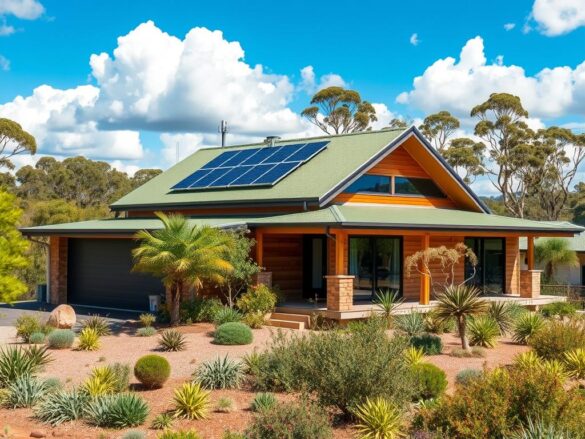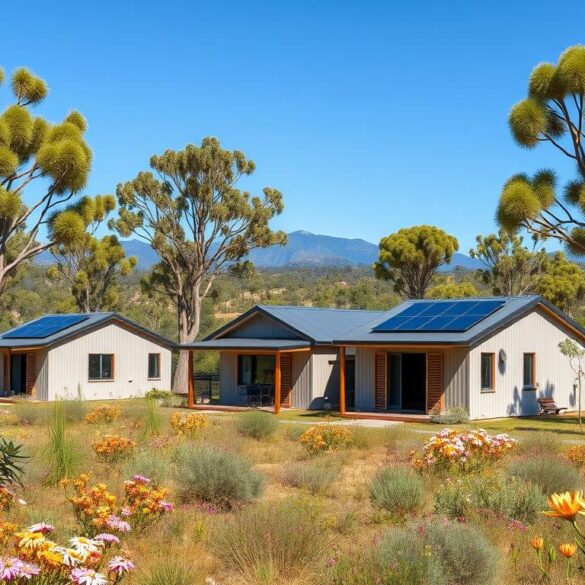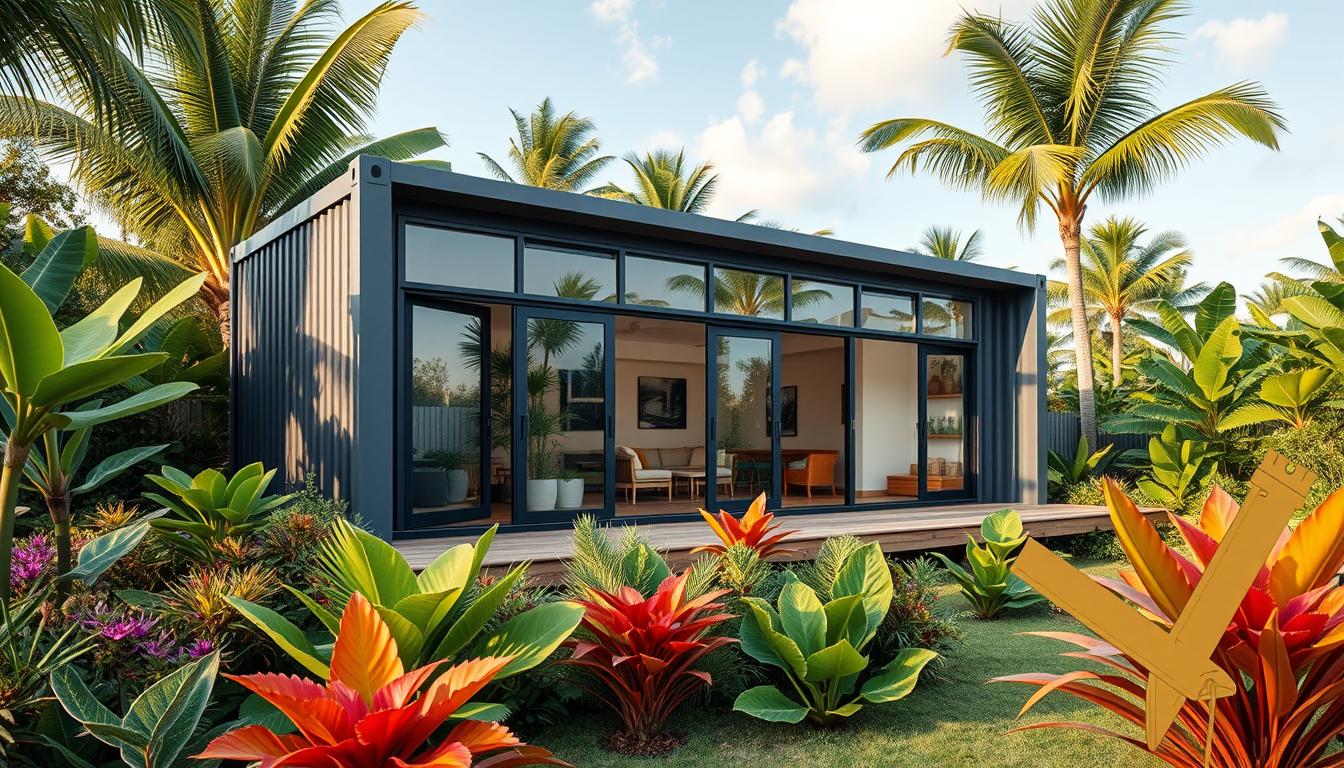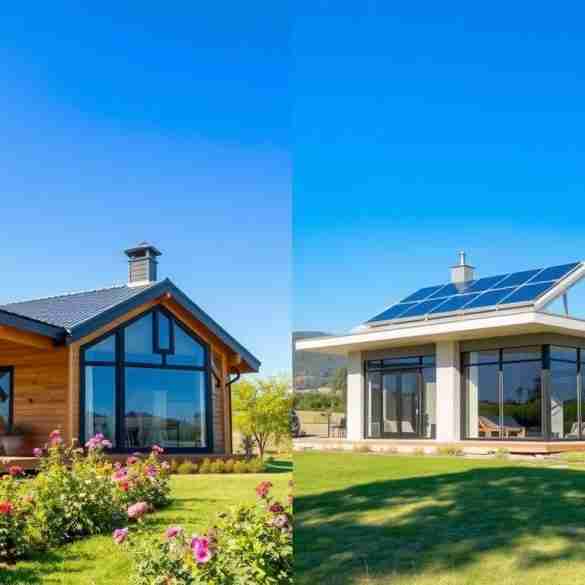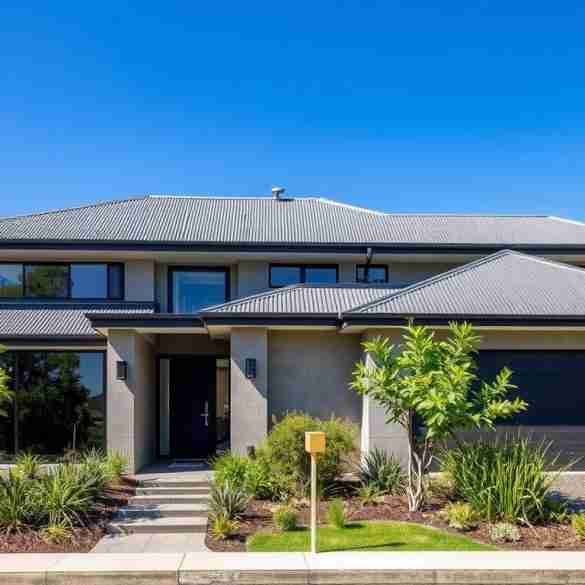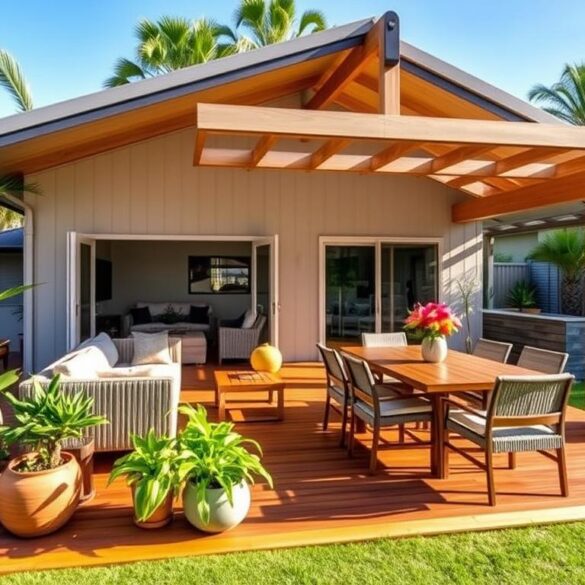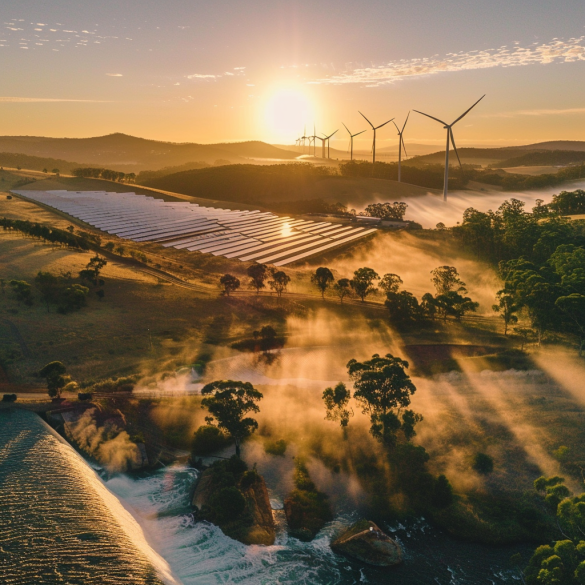The Queensland government is working hard to support green homes. They’ve increased the Housing Investment Fund (HIF) to $2 billion. This money helps build eco-friendly homes.
They want to make 5,600 new homes by June 2027. These homes will be affordable and good for the environment. This shows the government’s dedication to making homes better for everyone.
The HIF gives $130 million each year for new homes. This helps developers and builders make homes that are good for the planet. It’s a big step towards a greener future.

Key Takeaways
- The Queensland government has boosted the Housing Investment Fund (HIF) to $2 billion to support sustainable housing initiatives.
- The HIF provides $130 million in annual funding for new social and affordable housing projects that prioritize environmental responsibility.
- The program empowers developers, builders, and community housing providers to create eco-friendly homes across Queensland.
- The investment aims to deliver 5,600 new social and affordable housing units by June 2027, promoting accessible and sustainable living.
- The comprehensive financing approach highlights the government’s commitment to a greener and more resilient future for Queensland.
Understanding Sustainable Housing in Queensland
In Queensland, sustainable housing is becoming more popular. The state government is pushing for green building and energy-saving designs. These efforts help cut down on carbon emissions and make homes safer from natural disasters like cyclones.
Definition of Sustainable Housing
Sustainable housing in Queensland means using resources wisely and being kind to the environment. It includes using solar power, saving water, and choosing eco-friendly materials. Sustainable Homes offers homes with solar systems to help homeowners go green.
Importance for the Environment
The push for sustainable housing in Queensland is about fighting climate change and building stronger communities. By using sustainable practices, homeowners can use less energy, cut down on emissions, and help the environment. Programs like the Household Resilience Program help make homes safer from cyclones, showing Queensland’s dedication to green building.
“Sustainable housing is not just about reducing energy use; it’s about creating homes that are resilient, adaptable, and in harmony with the environment. By investing in sustainable solutions, Queenslanders can contribute to a greener, more livable future.”
| Sustainability Funding Queensland | Climate-Resilient Construction Queensland |
|---|---|
| $25,000 grant available for first home buyers in Queensland for homes up to the value of $750,000. | The Household Resilience Program offers funding to eligible homeowners to improve the resilience of their homes against cyclones. |
| The grant is applicable until 31st December, 2020. | The program is part of the state government’s commitment to promoting climate-resilient construction in Queensland. |
| Financial guidance includes assistance in choosing loan amounts, finding suitable financial products, and loan structures. | Sustainable Homes, a leading provider in the state, offers eco-friendly home designs with pre-installed solar systems to help homeowners reduce their carbon footprint. |
Financial Options for Sustainable Housing
Queensland has many ways to help with sustainable housing. You can get traditional home loans or special green home loans. These loans help pay for homes that save energy and are good for the planet.
Traditional Home Loans
Big banks in Queensland offer traditional home loans. You can use these loans to buy or fix up homes that save energy. This includes homes with solar panels and water-saving tech.
Green Home Loans
Queensland also has green home loans for homes that save energy. These Energy-Efficient Mortgages have lower interest rates. They also offer extra help for making homes more eco-friendly.
Low-Interest Financing
The Queensland Government has low-interest loans for sustainable homes. The Eco-Friendly Home Loans Queensland program gives loans with lower interest rates. These loans are for homeowners and developers who want to build green.
| Grant Program | Funding Range |
|---|---|
| Lord Mayor’s Better Suburbs Grants | $10,000 – $200,000 |
| Housing Support Program | $2,000 – $10,000 |
| Pathways out of Homelessness Grant Program | Up to $450,000 over 3 years |
| Seniors Celebration Donation | $100 – $300 |
| Lord Mayor’s Community Fund | $250 – $10,000 |
| Creative Sparks Grants Program | Up to $15,000 |
| Lord Mayor’s Community Sustainability and Environmental Grants | $1,000 – $8,000 (operations), up to $20,000 (projects) |
| Cultivating Community Gardens Grants | $1,000 – $2,500 |
| Sustainability Grants | $1,000 – $10,000 |
| Native Wildlife Carers Grants | $500 – $5,000 |
With these financial options and government grants, making sustainable homes in Queensland is easier. It’s more affordable for homeowners and developers too.
Government Grants for Sustainable Housing
The Queensland government has many grants for sustainable housing. These programs help make homes more eco-friendly. They encourage using green technologies and practices.
Types of Grants Available
The Housing Investment Fund is one key program. It helps with social and affordable housing that’s green. Grants go to projects that save energy and use renewable energy.
Eligibility Requirements
Each grant has its own rules. But, they often look for projects that cut down on pollution. They also want projects that save water and use green materials. Projects must also help the community and be open to everyone.
How to Apply for Grants
To apply, you need to send in a project idea and a detailed plan. You’ll have to tell about your project’s design, budget, and how it will help the environment. The government sets deadlines for these grants, so it’s good to stay updated.
Recently, the Household Resilience Program got more money. Now, homeowners can get grants to make their homes better. This includes making them more energy-efficient and safe from disasters.
| Grant Program | Funding Amount | Eligibility Criteria | Application Process |
|---|---|---|---|
| Housing Investment Fund | $255 million approved since 2015 | Focus on social and affordable housing with sustainable features | Expression of interest and detailed proposal submission |
| 2024-28 Local Government Grants and Subsidies Program (LGGSP) | Up to $115 million in new funding | Supporting infrastructure projects, including up to $10 million for planning | Maximum of two infrastructure and one planning project application per council |
| Household Resilience Program Phase 4 | $20 million in additional funding | Upgrade homes to improve energy efficiency and disaster resilience | Applications currently open |
These grants help make Queensland’s housing more sustainable. Homeowners, developers, and local governments can all contribute. Together, they can make a big difference.
Private Sector Support for Sustainable Housing
In Queensland, the private sector is key in supporting green housing. Developers, builders, and investors are working together. They’re making new, eco-friendly homes all over the state.
The Housing Investment Fund helps the public and private sectors work together. They focus on building homes that are affordable, safe, and good for the planet.
Bank Programs and Offers
Big banks like ANZ are helping fund homes that are affordable and green. They’ve helped with projects in Queensland that will add almost 1,000 new homes. This includes the Woree project in Cairns and places in southeast Queensland.
These efforts show the private sector’s commitment to Green Building Initiatives Queensland and Eco-Friendly Home Loans Queensland.
Non-Governmental Organizations
NGOs and community groups are also important in Queensland’s green housing efforts. They offer money, resources, and education. This helps homeowners and builders make their projects more eco-friendly.
Working with the private and public sectors, NGOs make sustainable housing efforts stronger. They help these projects reach more people across the state.
Community Funding Initiatives
At the local level, community funding is helping too. These efforts are led by neighborhood groups or environmental organizations. They help gather resources for green housing projects that meet local needs.
These initiatives make people feel like they own a part of the solution. They help Queenslanders play a big role in shaping their homes’ future.
The private sector’s commitment to sustainable housing in Queensland is crucial in addressing the pressing challenges of affordability and environmental impact. By partnering with developers, builders, and community organizations, we can unlock new possibilities for eco-friendly living that benefits both people and the planet.”

Prominent Grants and Programs in Queensland
There are many grants and programs in Queensland for sustainable housing. The Sustainable Home Magazine shows how important these are. They help make homes more eco-friendly across the state.
Queensland Government Initiatives
The Queensland government is leading in sustainable housing. The Housing Investment Fund and the Household Resilience Program are key examples. They offer funding and resources for sustainable features in homes.
Federal Government Programs
The federal government also supports sustainable housing in Queensland. The Renewable Energy Rebates Queensland gives money for solar panels and other green solutions.
Local Council Supports
Local councils in Queensland offer their own help for green homes. They provide subsidies, grants, and advice. It’s good to talk to your local council for more info.
“The Queensland Housing and Homelessness Action Plan 2021-25 represents the largest concentrated investment in social and affordable housing in the state’s history.”
The options for sustainable housing in Queensland are growing. By using these programs, we can move towards a greener future.
Sustainable Housing Certification Programs
In Queensland, green building programs are key. The Green Star and NABERS ratings help a lot. They affect how you can get loans and grants.
Green Star Certification
The Green Star system checks how green buildings are. It looks at energy use, water, air quality, and materials. Buildings must meet tough standards to get a rating.
Green Star buildings use 66% less energy and 51% less water. They also attract green finance, like green bonds. This shows the financial benefits of going green.
NABERS Ratings
NABERS is another big program in Queensland. It rates how green buildings are now. It looks at energy, water, and waste.
NABERS ratings help buildings’ value and rent. A high rating can also get you government grants. These grants help with energy-efficient mortgages and green homes.
Importance of Certification for Financing
Green Star and NABERS are very important in Queensland. They show a building’s green commitment. They also help get loans and government help.
The Brisbane Green Buildings Incentive Policy gives up to 50% of infrastructure charges. This is for buildings that meet Green Star standards. It shows Queensland’s support for green buildings.

Sustainable housing programs in Queensland are vital. They ensure buildings are good for the environment. They also open doors to financing and government help for a greener future.
Tax Incentives and Rebates
Queensland supports sustainable housing with tax incentives and rebates. These help people use renewable energy and energy-saving features in homes. Homeowners and builders can save money and help the planet.
Renewable Energy Certificates
The Renewable Energy Certificates (RECs) program is a big help in Queensland. It gives money back for installing things like solar panels. This way, you can save money and use less energy over time.
Home Builder Grant
The Home Builder Grant is also a big support. It gives up to $15,000 to first-time homebuyers or new home builders. This is great for those wanting an eco-friendly home.
Energy Efficiency Programs
Queensland also has programs for saving energy. You can get rebates for better insulation or energy-saving appliances. These help lower your bills and make your home greener.
Using these incentives, Queensland homes can be greener and cheaper to run. These programs help make homes more sustainable and save money for residents.
“Sustainable home design can lead to long-term cost savings and reduce environmental impact.”
Eco-Friendly Building Materials and Their Funding
In Queensland, using eco-friendly building materials is key for sustainable homes. There are many funding options to help use these materials. The Queensland government supports green building with several initiatives.
Sustainable Material Options
There are many sustainable materials in Queensland. You can use recycled timber, bamboo, and low-emission concrete. These choices help the environment and make homes more energy-efficient.
Funding for Green Materials
The Queensland government offers funding for green materials. The Environmental Upgrade Finance (EUF) helps with loans for environmental upgrades. The CEFC Household Energy Upgrades Fund is a $1 billion program for cleaner energy solutions.
Cost-Benefit Analysis of Eco-Friendly Materials
Using eco-friendly materials might cost more at first. But, they save money on energy in the long run. They also help the environment. Grants and loans can help with the initial costs.
| Funding Program | Details | Eligibility |
|---|---|---|
| Environmental Upgrade Finance (EUF) | Building upgrade loans for environmental works, up to 100% project finance, 4-20 year repayment terms | Building on rateable land, primarily non-residential |
| CEFC Household Energy Upgrades Fund | $1 billion fund for homeowners to transition to cleaner energy | Homeowners upgrading energy performance initiatives |
| Green Home Loans | Discounted loans for sustainable upgrades like solar battery systems | Homeowners undertaking approved energy-efficient renovations |
With these funding options, making homes more sustainable is easier in Queensland. This helps with Climate-Resilient Construction Queensland and Green Building Initiatives Queensland.

The Role of Environmental Consultants
Environmental consultants are key in Queensland’s sustainable housing projects. They know how to deal with grants, certifications, and rules. Their advice is very helpful for those wanting to make their homes green.
Choosing the Right Consultant
Finding the right consultant is crucial. Look for someone with Queensland experience and knowledge of local rules. Sustainable Home Magazine or your local Green Building Council can give good recommendations.
Benefits of Professional Guidance
Having a consultant can greatly help your project. They can find and help you apply for Sustainability Funding Queensland and Green Building Initiatives Queensland. They also help with getting certifications like Green Star or NABERS, which can help get funding.
Cost of Consulting Services
The cost of consulting varies based on the work needed and the consultant’s experience. But, some government programs might cover this cost. A good consultant can help you get more funding and make your home more sustainable.
| Consultant Expertise | Average Hourly Rate (AUD) |
|---|---|
| Sustainability Specialist | $150 – $250 |
| Green Building Consultant | $200 – $300 |
| Environmental Compliance Advisor | $180 – $280 |
The table shows average hourly rates for different consultants in Queensland. Rates can change based on experience, project complexity, and needed services.
“Working with an experienced environmental consultant was a game-changer for our sustainable housing project. They helped us navigate the funding landscape, secure the necessary certifications, and ensure we were in compliance with all relevant regulations. Their expertise was invaluable in bringing our vision to life.”
– Jane Doe, Homeowner, Queensland
Community Initiatives Supporting Sustainable Housing
In Queensland, community efforts are key to growing sustainable homes. Local programs and workshops teach people about green homes and funding. This helps everyone learn about the options and how to get help.
Local Community Programs
The Gambling Community Benefit Fund (GCBF) in Queensland gives grants up to $35,000 for projects. This includes work on sustainable homes. The last chance for 2024 funding is on November 30, 2024.
Also, the Emergency Relief and Food Relief programs help with money and food. They support families facing challenges in finding sustainable homes.
Workshops and Information Sessions
Groups and non-profits host workshops to talk about Green Building Initiatives Queensland and Sustainability Funding Queensland. These events share new green home tech, funding, and government help. They help people make smart choices for their homes.
Role of Non-Profits
Non-profits lead in promoting green homes in Queensland. They work with governments, businesses, and people to start eco-friendly projects. They push for policy changes and help get Sustainability Funding Queensland for green homes.
Thanks to these efforts, Queensland is moving towards a greener future. Green and energy-saving homes are becoming more common.
| Grant Program | Funding Details |
|---|---|
| Gambling Community Benefit Fund (GCBF) | Offers grants of up to $35,000 for community projects, including sustainable housing initiatives. Final funding round for 2024 closes on November 30, 2024. |
| Emergency Relief and Food Relief Programs | Provide financial and material assistance to individuals and families, supporting their access to sustainable housing options. |
| Financial Counselling for Gambling Services | Aim to support people experiencing financial stress due to gambling harm, helping them address sustainable housing challenges. |
| General Fund Grant Program | Supports mid-tier organizations with projects that strengthen communities, offering grants up to $30,000 per individual grant. |
Future Trends in Sustainable Housing Financing
Queensland is facing big challenges with growing populations and housing costs. The state is changing how it finances sustainable homes. New ways of funding green homes and policy updates are leading the way.
Innovations in Green Financing
The Queensland Government wants to grow programs like the $1 billion Housing Investment Fund. This fund helps with social and affordable housing needs. It also supports sustainable community development in key areas.
There’s a big push for passive house designs and net-zero housing finance. This means homeowners can get loans for homes that save energy and are good for the planet.
Potential Policy Changes
Policymakers in Queensland are working on new rules to help with sustainable housing. They might change grants and incentives. They could also introduce policies that encourage green building materials and energy-saving tech.
The government is also working to improve the state’s old social housing. They want to make homes that are both accessible and sustainable.
Predictions for Sustainable Housing Support
In the future, Queensland will focus more on passive house subsidies and net-zero housing finance. These changes, along with investments in communities and infrastructure, look promising. Homeowners and developers can learn from Sustainable Home Magazine and other experts.
FAQ
Q: What financial options are available for sustainable housing in Queensland?
A: In Queensland, you can get home loans for green homes. There are also low-interest loans for building sustainable homes. These options help make homes better for the environment.
Q: What government grants are available for sustainable housing projects in Queensland?
A: The Queensland government has grants for green homes. The Housing Investment Fund is one example. You need to meet certain requirements and follow a specific application process.
Q: How does the private sector support sustainable housing in Queensland?
A: Private companies help by working with developers and investors. The Housing Investment Fund encourages this teamwork. Community groups also help fund green homes.
Q: What are the prominent grants and programs for sustainable housing in Queensland?
A: Key programs include the Housing Investment Fund and the Household Resilience Program. The state’s action plan for 2021-25 is a big investment in affordable housing. Local councils also support green housing projects.
Q: What role do sustainable housing certification programs play in Queensland?
A: Programs like Green Star and NABERS are very important. They help with financing and grants. Queensland values these certifications for their role in sustainability.
Q: What tax incentives and rebates are available for sustainable housing in Queensland?
A: Queensland offers tax breaks and rebates for green homes. You might get credits for using renewable energy. The Home Builder Grant can also apply to green projects.
Q: How is funding provided for eco-friendly building materials in Queensland?
A: The government has programs for green building materials. Sustainable materials are encouraged in building projects. Grants consider the cost and benefits of these materials.
Q: What is the role of environmental consultants in sustainable housing projects in Queensland?
A: Environmental consultants are key in green projects. They help with grants and following rules. Their services might be funded by the government.
Q: How do community initiatives support sustainable housing in Queensland?
A: Local efforts are vital for green homes. Workshops and info sessions teach about green options. Non-profits also help with green projects.
Q: What are the future trends in sustainable housing financing in Queensland?
A: Queensland might see new green financing ideas and policy changes. The government is always updating its programs. Expect more focus on passive houses and zero-carbon homes.

